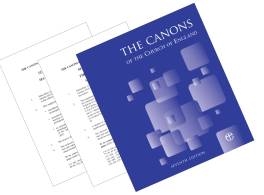Religious Communities
DA 1 Of religious communities
1. The Church of England affirms that, since the time of the early Church, there have been Christian people who, in response to God’s call, have committed their whole lives to God in the religious life, a radical commitment, shaped by the evangelical counsels, marked by consecrated celibacy, poverty and obedience, and fulfilled as a member of a community where the religious life is lived in common or as a solitary; and that at various times, other Christian people have responded to the same call, fulfilling their baptismal promises through particular forms of public commitment and of accountability in obedience to Christ as members of other communities and societies.
2. (1) A religious community in the Church of England is a community of persons—
(a) which has a particular vocation in the service of the Gospel,
(b) whose members seek to frame and fashion their lives in accordance with a rule or other pattern of life that is particular to members of that community, and
(c) which is declared by the House of Bishops to be a religious community in the Church of England.
(2) A reference in this Canon, or in any of the other Canons, to a religious community is a reference to a religious community in the Church of England.
3. A religious community may include among its members persons who are not members of the Church of England.
4. (1) The House of Bishops may not make a declaration under paragraph 2(1)(c) in the case of a community unless it is satisfied that the community meets such conditions as the House shall specify in regulations.
(2) The regulations may, in particular, specify conditions relating to—
(a) governance;
(b) financial affairs;
(c) safeguarding children and vulnerable adults;
(d) the making of vows or promises;
(e) the minimum number of members required for a community to be eligible for a declaration under paragraph 2(1)(c).
(3) The conditions which may be specified in the regulations under sub-paragraph (2)(a) include conditions as to the procedure which a community must follow in order to amend its constitution or other governing document.
(4) In paragraph (2)(c)—
"child" means a person aged under 18, and
“vulnerable adult” has the same meaning as in the Safeguarding and Clergy Discipline Measure 2016.
5. The House of Bishops may, for some grave cause, revoke a declaration made under paragraph 2(1)(c).
6. The House of Bishops shall compile, maintain and publish a list of religious communities.
7. The House of Bishops may by regulations make further provision about religious communities.
8. (1) The House of Bishops may by regulations amend or revoke regulations made under this Canon.
(2) Regulations under this Canon may make different provision for different purposes (including, in particular, different provision according to whether a community was established before or after the commencement of this Canon).
(3) Regulations under this Canon may confer a discretion.
(4) Regulations under this Canon shall be laid before the General Synod and shall not come into operation unless and until they have been approved by the Synod.
(5) Where the Business Committee of the General Synod determines that regulations under this Canon do not need to be debated by the Synod then, unless notice is given by a member of the Synod in accordance with its Standing Orders that the member wishes the regulations to be debated, the regulations shall for the purposes of paragraph (4) be deemed to have been approved by the Synod.
9. (1) The House of Bishops may issue guidance on religious communities.
(2) Every member of a religious community, and every person exercising functions in relation to a religious community, shall have regard to such guidance as is issued under this paragraph.
(3) The House of Bishops may amend or revoke guidance issued under this paragraph.
